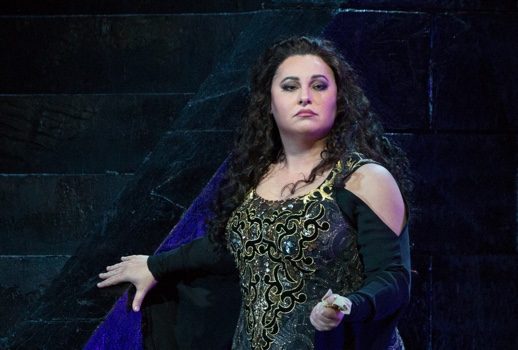
 Blood-and-guts singing is the reason to see Nabucco at the Metropolitan Opera this season. Featuring a vocally adventurous cast, and the keen conducting of James Levine, the company redeems a seemingly cheap and outdated production by Elijah Moshinsky, with passionate music making and searing theatricality.
Blood-and-guts singing is the reason to see Nabucco at the Metropolitan Opera this season. Featuring a vocally adventurous cast, and the keen conducting of James Levine, the company redeems a seemingly cheap and outdated production by Elijah Moshinsky, with passionate music making and searing theatricality.
Nabucco, which is based on the play Nabuchodonosor by Auguste Anicet-Bourgeois and Francis Cornu, expands upon stories located within the Hebrew Bible. The Jews, having been conquered by the Babylonian king Nabucco (or, in the English variation, Nebuchadnezzar), win their freedom through the miracles of Jehovah and the overwhelming political power of conversion. Within this broad plot, there are Machiavellian machinations and romantic intrigues, especially regarding the king’s daughters, Abigaille and Fenena, and the Jewish Ismaele.
The opera’s plot sympathizes with notions of colonization and misogyny. Abigaille, usurping Nabucco’s place as king and ruler of the Babylonians, exemplifies the stock character of the presumptuous, arrogant woman. And over the course of the opera, she reveals her true origins as that of a slave, compounding her pretentiousness.
Moreover, the libretto figures Abigaille as a woman ruled by passion and emotion, and not by reason or sound judgment—much of what drives her is a jealous love for Ismaele, and a desire to seek revenge on his beloved Fenena. As to be expected within the opera’s nineteenth century context, all does not end well for Abigaille, who faces a stiff penalty for her female arrogance.
Nabucco undergoes a similar trajectory of vanity and humiliation. Having declared himself a god, he is struck mad by Jehovah, and reduced to an embarrassing state of ineptitude. However, seeing the error of his ways, he repents to the “true” god of the Israelites, and in return he is granted his senses. With his mind in working order, he is able to regain his power, all while remaining devoted to a new religion.
These themes of rising and falling, of madness and sanity, recall the topsy-turvy power dynamics of Shakespeare’s King Lear, a figure who undergoes a similar cycle of pride, humiliation, insanity, and reconciliation. Moreover, the relationship between Fenena, the true princess of Babylon, and Nabucco echoes the strained bond between Lear and Cordelia. In both cases, a tear in the Great Chain of Being, in which hierarchy is subverted, has dire, calamitous ramifications.
I am less than eager to buy into these themes, merely because they work to reinforce the structures of patriarchy and heteronormativity that have long oppressed women and people of color. And while the opera sympathizes with the oppression of the Israelites, its means of undoing that oppression are hardly radical.
The patriarchal king is merely reinstated, but this time with a new (patriarchal, in the truest sense) god leading the way. The mechanisms of power and oppression that created this scenario in the first place have hardly been reworked. While many may merely chalk this up to context (19th century Italy), it’s difficult to really engage emotionally with an operatic plot that seems so unaware of subversive, radical counter-discourses.
Lest I am branded too politically correct, I will say that most of these trite narrative moves are overwhelmed by the sheer vocal force of a musical ensemble that cannot be stopped. To begin with Liudmyla Monastyrska brings a level of chutzpah to Abigaille I have not seen at the Met since Anna Netrebko seared my soul with her performance in Manon Lescaut.
Full-throttled, gutsy, and campy (in the best sense of the word), Monastyrska stomps about the stage with life-affirming bravado. Her deeply satisfying Abigaille is one that borders on the edge of good taste. She is reckless, bold, and joyful; her performance is thrilling.
In light of Monastyrska’s Abigaille, it is hard to get behind the political power of Plácido Domingo’s Nabucco, who appears more milquetoast than he probably intends. His baritone, as usual, sounds more like a tenor essaying a baritone role. But still, his singing is effective and moving, despite the sense that he is miscast.
Jamie Barton and Russell Thomas are appealing as the lovers Fenena and Ismaele. Barton is especially moving, her dramatic commitment deepening a role that might be merely tossed off as one-dimensional. Her mezzo is elegant and rich as well, except at the end of her aria, “O, dischiuso è il firmamento!” when her high A spreads a bit. As her counterpart, Thomas is more reliable, and equally expressive.
As Zaccaria, High Priest of the Hebrews, Dimitry Belosselskiy sings with a luxurious, exciting bass, his middle voice noteworthy for its resonance and evenness. However, his low notes are, at times, difficult to hear.
But the real star of the evening, as is usually the case with Nabucco, is the chorus, under the supervision of Chorus Master Donald Palumbo. Their emotional reading of the evergreen “Va, pensiero” moves with a haunting solemnity. And, beyond this famous passage, the chorus contributes significantly to the evening’s overall appeal, cultivating a deep sense of the communal crisis that undergirds the opera’s drama. Conductor James Levine, warmly received in the house, pulls the entire ensemble together expertly, driving the Met Orchestra through the score.
Moshinksky’s 2001 production remains odd and stylistically confusing. The costumes are especially confounding, resembling something somewhere between a summer stock production of Les Misérables and Xena: Warrior Princess. The large, overblown set turns on a turntable, gothic and shadowy, but does little beyond that to invoke the wonder and brutality of the ancient world.
In the end, excellent music and courageous performances triumph over a lackluster production and weak libretto. Fortunately for us, enough miracles are located within the music, within the singing, and within the playing, to make any pagan a true believer in this Nabucco.
Photo: Marty Sohl/Metropolitan Opera























Comments